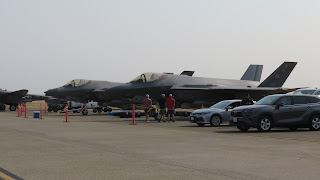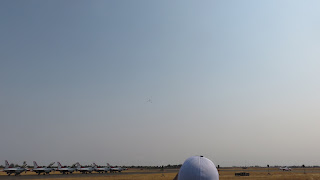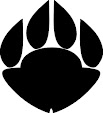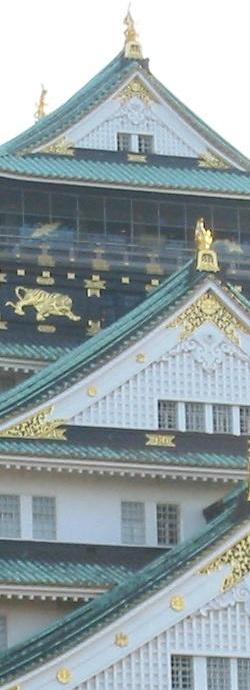I forgot to preface this in part 1. One, it was a hot day in Rancho Cordova during the airshow. Luckily, it was a dry heat. All day long under the sun and heat, it eventually got to me. By the time the Thunderbirds started their show, I had to sit on the ground to watch the show. I should have drank more water but lesson learned. Also, I thought my camera was malfunctiong at one point. I could not take any video no matter how hard I hit the bottom. Later I realized the memory card was full with over 2 years worth of vacation pictures and movies. Over a thousand pics/videoes were deleted. Anyway...
Seeing doubles of F18s and F35

Legacy fighters: F4U Corsair, F8 Bearcat, and a partial P38 Lightning

Refered to as the Lightning II, it is currently offered in 3 variants: F35 A-Air Force, F35 B-Marines, F35 C-Navy
Not pictured, the F35 B has vertical lift capabilities like the Harrier. The rear can turn 90 degrees to the the ground and direct thrust downward.
In the mid section is another lifting fan. Doors on the upper part of the aircraft, behind the cockpit, open up to allow air to flow. Smaller control jets under the wings help with stability

Jagged lines along the landing gear doors and armament bays help with the stealth aspects
The 25mm cannon is located on the left wing just behind the pilot. Capable of speeds up to mack 1.6, it is slower than the F22 and the venerable F15.
Armaments are stored internally for stealth reasons. These bays have to be opened before they can be fired/dropped
A variety of bombs and missles can be stowed within. The payload of the aircraft varies with its model
The F/A18 originally flew into service in late 1978 but still edges the F22 in speed
The Hornet is used by the Navy's Blue Angels precision flying team. They were debuted with the team in 1986
The E and F variants are referred to as the Super Hornet with upgrades over the older models including an increase in size
Dual exhaust nozzles and tailhook. The exhaust is covered but each can put out 17,700 pounds of thrust. The tailhook is used to the the arresting cable on carrier landings
The stars of the show, the USAF Thunderbirds' F16
The F16 was put into Thunderbird service, just 3 years prior to the Blue Angels F18, in 1983. That puts it at 38 years of service with the team
In the SF bay area, we have Fleet Week on a yearly basis. The Blue Angels accompany the ships that sail into SF Bay and perform several times. They practice during the days leading up to the shows and buzz the tall buildings of downtown
Thunderbirds from behind bars
The Canadian Snowbirds are a staple of numerous airshows. Today, they precede the headliner Thunderbirds
They have performed on occasion during the afore mentioned Fleet Week
A team of nine but one of the pilots was under the weather was not fit to fly in the demonstration
The announcer mentioned that these aircraft were built in the 1960's. The roar of these planes is not significant and could be viewed without ear plugs
Snowbirds, take a bow for your performance
Pilots are strapped in with their trays stowed and seatbacks in the upright position
You will notice the elongated cockpit of this taxiing F16. This allows for a second person in addition to the pilot..
In most planes configured in this way allows pilots to train on a new plane.
In the previous post, there was a picture of a T38 trainer. It too had the longer canopy to allow for a second person. The T38 were the predecessors to the current F16
This is not a duplicate or reordered picture. The next F16 to rollout also makes room for two.
Two Thunderbirds, with one in the inverted position, fly low over the field
Single solo pass in front of the audience
Security were posted near the fence bordering the field. Being postioned at the fence, you cant help but get them in most shops
Video to follow once its edited




































